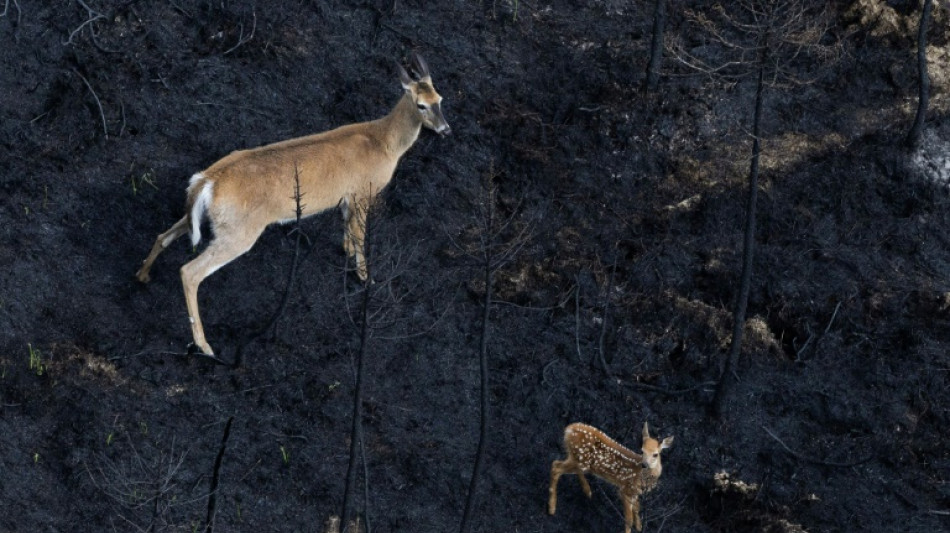
-
 Syria army enters Al-Hol camp holding relatives of jihadists: AFP
Syria army enters Al-Hol camp holding relatives of jihadists: AFP
-
Brook apologises, admits nightclub fracas 'not the right thing to do'

-
 NATO chief says 'thoughtful diplomacy' only way to deal with Greenland crisis
NATO chief says 'thoughtful diplomacy' only way to deal with Greenland crisis
-
Widow of Iran's last shah says 'no turning back' after protests

-
 Waugh targets cricket's 'last great frontier' with European T20 venture
Waugh targets cricket's 'last great frontier' with European T20 venture
-
Burberry sales rise as China demand improves

-
 Botswana warns diamond oversupply to hit growth
Botswana warns diamond oversupply to hit growth
-
Spaniard condemns 'ignorant drunks' after Melbourne confrontation

-
 Philippines to end short-lived ban on Musk's Grok chatbot
Philippines to end short-lived ban on Musk's Grok chatbot
-
Police smash European synthetic drug ring in 'largest-ever' op

-
 Japan to restart world's biggest nuclear plant Wednesday
Japan to restart world's biggest nuclear plant Wednesday
-
South Korean ex-PM Han gets 23 years jail for martial law role

-
 Alcaraz, Sabalenka, Gauff surge into Australian Open third round
Alcaraz, Sabalenka, Gauff surge into Australian Open third round
-
Over 1,400 Indonesians left Cambodian scam groups in five days: embassy

-
 Raducanu to 're-evaluate' after flat Australian Open exit
Raducanu to 're-evaluate' after flat Australian Open exit
-
Doncic triple-double leads Lakers comeback over Nuggets, Rockets down Spurs

-
 Bangladesh will not back down to 'coercion' in India T20 World Cup row
Bangladesh will not back down to 'coercion' in India T20 World Cup row
-
Alcaraz comes good after shaky start to make Australian Open third round

-
 Trump departs for Davos forum again after switching to new plane: AFP
Trump departs for Davos forum again after switching to new plane: AFP
-
Impressive Gauff storms into Australian Open third round

-
 Dazzling Chinese AI debuts mask growing pains
Dazzling Chinese AI debuts mask growing pains
-
Medvedev battles into Melbourne third round after early scare

-
 Denmark's Andresen upstages sprint stars to take Tour Down Under opener
Denmark's Andresen upstages sprint stars to take Tour Down Under opener
-
Turkey's Sonmez soaks in acclaim on historic Melbourne run

-
 Sheppard leads Rockets to sink Spurs in Texas derby
Sheppard leads Rockets to sink Spurs in Texas derby
-
Sabalenka shuts down political talk after Ukrainian's ban call

-
 Trump's plane returns to air base after 'minor' electrical issue: White House
Trump's plane returns to air base after 'minor' electrical issue: White House
-
Barcelona train crash kills 1 in Spain's second deadly rail accident in days

-
 North produces enough nuclear material a year for 10-20 weapons: S. Korea president
North produces enough nuclear material a year for 10-20 weapons: S. Korea president
-
Japan ex-PM Abe's alleged killer faces verdict

-
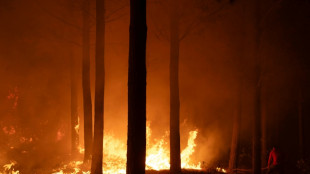 Climate change fuels disasters, but deaths don't add up
Climate change fuels disasters, but deaths don't add up
-
Stocks stable after tariff-fuelled selloff but uncertainty boosts gold

-
 What growth?: Taiwan's traditional manufacturers miss out on export boom
What growth?: Taiwan's traditional manufacturers miss out on export boom
-
'Super-happy' Sabalenka shines as Alcaraz gets set at Australian Open

-
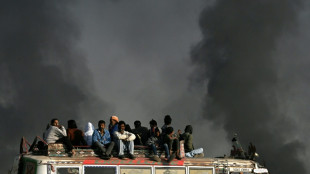 With monitors and lawsuits, Pakistanis fight for clean air
With monitors and lawsuits, Pakistanis fight for clean air
-
Sabalenka sets up potential Raducanu showdown at Australian Open

-
 Chile president picks Pinochet lawyers as ministers of human rights, defense
Chile president picks Pinochet lawyers as ministers of human rights, defense
-
Osaka says 'I'm a little strange' after Melbourne fashion statement

-
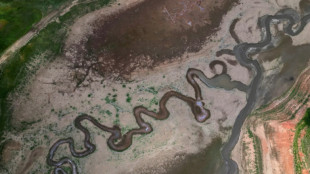 UN report declares global state of 'water bankruptcy'
UN report declares global state of 'water bankruptcy'
-
Trump heads for Davos maelstrom over Greenland

-
 Ukraine's Oliynykova wants Russian, Belarusian players banned from tennis
Ukraine's Oliynykova wants Russian, Belarusian players banned from tennis
-
Kasatkina cannot wait to be back after outpouring of Melbourne support

-
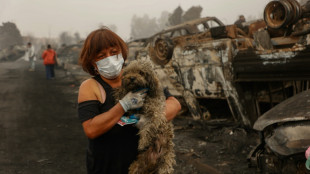 Chile blaze victims plead for help from razed neighborhoods
Chile blaze victims plead for help from razed neighborhoods
-
Russian minister visits Cuba as Trump ramps up pressure on Havana

-
 World order in 'midst of a rupture': Canada PM Carney tells Davos
World order in 'midst of a rupture': Canada PM Carney tells Davos
-
Senegal's 'historic' AFCON champs honoured with parade, presidential praise

-
 Audi unveil new car for 2026 Formula One season
Audi unveil new car for 2026 Formula One season
-
Man City humiliated, holders PSG stumble, Arsenal remain perfect

-
 Vinicius, Real Madrid need 'love' not whistles: Bellingham
Vinicius, Real Madrid need 'love' not whistles: Bellingham
-
Late Suarez winner stops Champions League holders PSG in Lisbon


Canada's wildfires take devastating toll on wildlife
No droppings, tracks, nests or other traces of wildlife -- Canada's boreal forests were devastated by record wildfires this year.
In the woodlands of Quebec province, hunter Paul Wabanonik searches for fresh moose tracks on his Indigenous tribe's ancestral lands, which had sustained him and his family.
"Normally, we would see traces everywhere," says the Ashinabe tribesman. But "it's like a desert," he says as he leads AFP journalists along a forest trail.
People in his village, hundreds of kilometers north of Montreal, was forced to flee advancing wildfires in June.
A few green shoots are just now starting to sprout in the once-lush green forest left charred by the fires.
Heading into the fall, the foliage would normally explode with brilliant red, orange and yellow colors, but it is now all blackened.
With no forest canopy, there is nothing left to hunt in order to feed Wabanonik and his family, and there's little chance of wildlife returning any time soon, he laments.
"We don't have a precise idea of the number of animals that died, but it's hundreds of thousands," says Annie Langlois, a biologist for the Canadian Wildlife Federation.
Beavers, coyotes, skunks, wolverines, foxes, bears -- the Canadian boreal forest is home to 85 species of mammals, 130 of fish and 300 of birds, including many migratory birds.
But it has been devastated by this year's record wildfire season, with more than 18 million hectares burned -- an area close to the size of Tunisia.
- Smoke particles -
The biologist notes that certain species can quickly become trapped, because they do not have the capacity to fly or run fast enough and over long distances in the face of very intense and rapidly advancing fires.
And in certain regions, the fires struck very early in the season, therefore shortly after gestation, leaving no chance for hatchlings or sucklings to escape.
The consequences are severe also for aquatic fauna. In addition to ash that blankets lakes and rivers, soil erosion caused by the loss of vegetation alters water quality.
"Lakes with clear, clear water in the Canadian Shield will fill with algae which will suck the oxygen from the water, so there will be less for the animals," Langlois explains, referring to a large area of exposed rock.
The chemical composition of wildfire smoke particles is also different from particles from other sources of pollution, such as car emissions or industrial pollution.
It contains a greater proportion of carbon-based pollutants in various chemical forms that are sometimes deposited hundreds of kilometers from the fires.
These fumes have acute or chronic effects on the health of wildlife, says Matthew Mitchell of the University of British Columbia.
"Young animals are often more susceptible to the effects of smoke, as are humans," he adds, and "even marine animals like whales and dolphins are affected when they emerge to breathe."
In Canada, nearly 700 species are already considered threatened, largely due to habitat destruction from logging and other encroachment.
Over the longterm, wildfires constitute an additional threat to wildlife.
This is the case for caribou. This Canadian emblem which lives in old forests , feeding on lichen, is unlikely to bounce back for several years from the ravages of fires.
"If the moose is likely to do well, the caribou will do less well, given that it is in a rather precarious situation," worries Gabriel Pigeon, professor at the University of Quebec in Abitibi-Temiscamingue.
The fires could also accentuate a phenomenon already observed by researchers and linked to climate change and the upheaval of ecosystems: certain species have moved north.
Thus is the case for a lynx that Pigeon follows using a radio collar. It has taken refuge 300 kilometers (185 miles) from its territory while its home range is generally 25 square kilometers.
The return of animals to burned areas will vary from one species to another. For some, it could take years.
U.Maertens--VB



